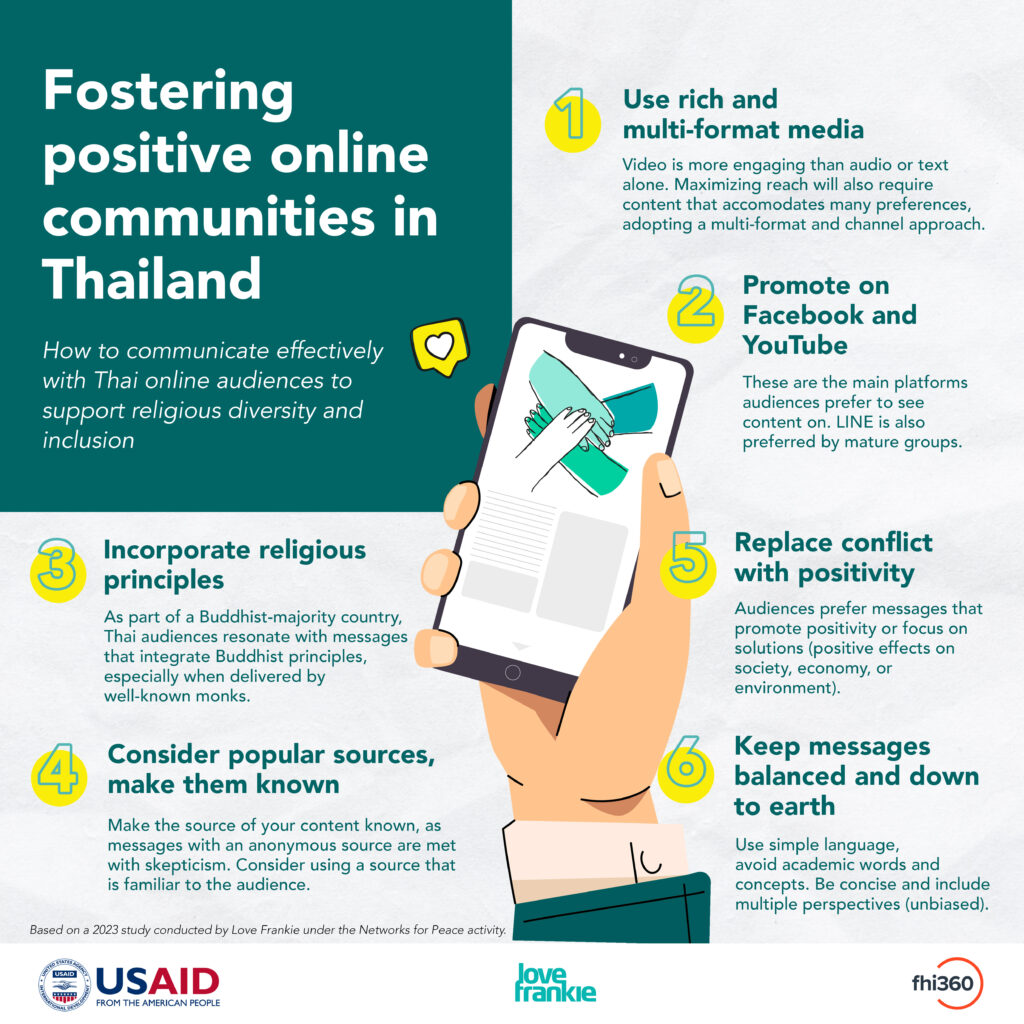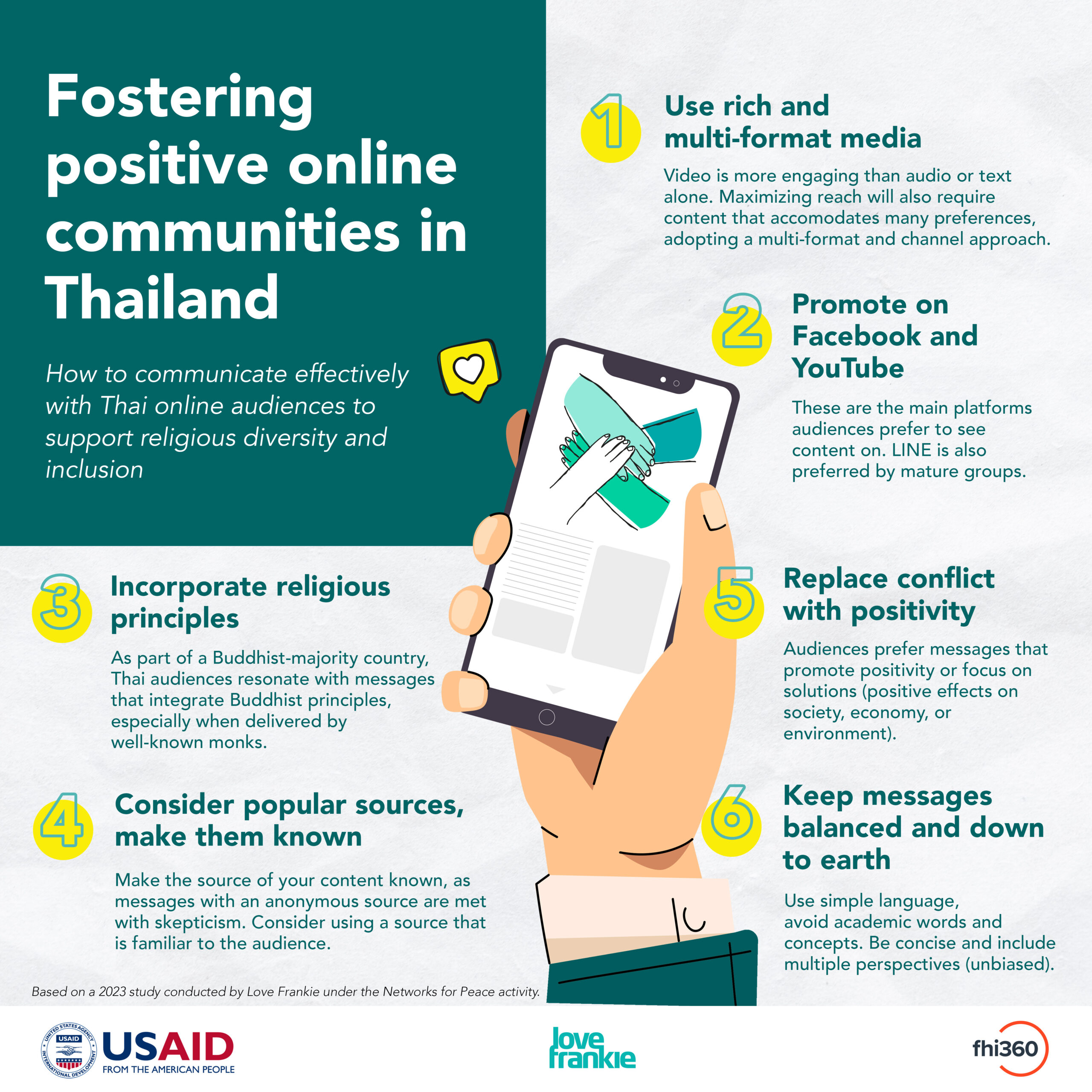Fostering positive online communities in South and Southeast Asia: How peacebuilders can use social media for good
The USAID-funded Networks for Peace project, implemented by FHI 360, works with civil society organizations and networks to promote intercommunal harmony and religious tolerance in South and Southeast Asia. The project’s first study of a forthcoming regional series sheds light on how to encourage Thai online audiences to adopt more tolerant and inclusive views.
On June 18, 2023, organizations, communities, and individuals around the world will recognize the second U.N. International Day for Countering Hate Speech — an occasion to renew global solidarity to address hate speech, which promotes divisiveness and catalyzes violence against others based on aspects of their identity, such as their religious beliefs, sexuality, race, or ethnicity.
Even as the world faces unprecedented challenges and harmful misinformation and disinformation proliferate online, people can shift conversations, replace divisive narratives with positivity and encourage others to choose inclusion over exclusion.
“Audiences are constantly inundated with news of conflict or scandal, which is often misinformation just trying to get more views. But we found that people desire more positive voices in the online space, especially if they are touching on areas the audience is interested in. When we amplify positive stories of diverse communities thriving in harmony with each other and emphasize the positive role religion and ethnicity can play, people are much more willing to engage and even share the content,” says Scott Aronson, Chief of Party for Networks for Peace.
The above points were highlighted in a recent study done in Thailand on social media consumption behaviors and the characteristics of audiences who are exposed to online hate speech that is directed at religious groups. The study was conducted by Love Frankie — a Thailand-based communications, research, and social change agency — and funded by the U. S. Agency for International Development (USAID) through the Networks for Peace project, which works with civil society organizations to advance intercommunal harmony in South and Southeast Asia.
From October 2022 to June 2023, researchers from Love Frankie took a deep dive to understand the online behaviors of Thai audiences susceptible to the influence of intolerant and divisive content online. They explored their motivations, worries and fears, as narratives are proven to be more effective when they address social media audiences’ concerns. Based on the findings, the researchers identified messaging, formats, and practices that would cater to the specific preferences of audiences depending on their age, gender, education, and geographical location. For example, due to the history of conflict in Thailand’s Southern provinces, audiences from this region tend to stay away from online content that explicitly promotes diversity, is controversial or comes from institutional sources, as such content is deemed too risky. Thus, peacebuilders need to keep social media content light to stay relevant in that region.
The key takeaway from the study is that amplifying positive narratives and emphasizing constructive contributions toward positive speech can effectively strengthen social cohesion and prevent conflict. The study also shares practical recommendations for designing effective communication strategies that can influence Thai online audiences to adopt inclusive views regarding different religions. Peacebuilders can use the recommended strategies to bring about transformative change.
The study’s other takeaways and recommendations are as follows (see figure below).
- The use of rich media, such as video, is more engaging, compared with audio or text alone; thus, a multi-format and multi-channel approach is recommended, with content that accommodates many preferences.
- Facebook and YouTube are the main platforms through which audiences in Thailand consume content online. The LINE messenger application was also mentioned by older audiences, while TikTok, Instagram and Twitter were indicated among the youngest audiences.
- The incorporation of familiar concepts from Buddhist motivational content is the most effective way to engage individuals with strong Buddhist beliefs. Messages that are delivered by renowned religious figures and discuss what is perceived as beneficial to others (such as karma and merit-making) are particularly effective.
- Messages that promote positivity are in high demand, as Thai audiences are averse to conflict and avoid content that attacks other groups or encourages political division. Secular messages promoting diversity can also be effective, but only if the messages clearly show positive effects on society, the economy, or the environment.
- Sources of information need to be made known, with a high preference for familiar sources. Messages with anonymous sources are met with heavy skepticism.
- While concise messages are recommended, audiences can be thrown off by messages that appear rushed or cut short. Plain language that avoids academic words and concepts is preferred.
- Including multiple perspectives makes the message feel unbiased and balanced, especially for secular messaging.

As a Networks for Peace activity, the study has also been shared during a series of country-level and regional exchanges with peacebuilding partners working on similar topics in other countries in the region, including Myanmar, Sri Lanka and Thailand. These sessions allowed Networks for Peace partners who work on addressing dangerous speech to share findings and best practices with like-minded peers and magnify the impact of their work in their respective countries.
For instance, Trends Digital, a tech company based in Thailand, is using Love Frankie’s research to inform their ongoing social and behavior change communication campaign to raise awareness about religious harmony and gender inclusivity among social media users in the country. Specifically, Trends Digital is using the demographic information and typical profiles of individuals who are susceptible to extreme online rhetoric to better identify and strategically segment the target audiences for their online campaign. According to Jadapa Anantanikorn, Director of Trends Digital, leveraging the information from the study will help Trends Digital “reach the intended audience more effectively.”
From June 2023, Love Frankie will replicate the study in Myanmar and Sri Lanka, and the findings will be completed in 2024. The findings, which will compare how communities that are from different countries but have similar Buddhist faith backgrounds engage with social media content, will help local practitioners and organizations deepen their understanding of how to approach positive online communications on both the national and regional levels.
Along with producing research findings, Networks for Peace will develop country-level toolkits that are easy to use and provide practical recommendations and strategies for the local context, as well as information to help analyze common themes, trends, and opportunities for responses at the regional level.


